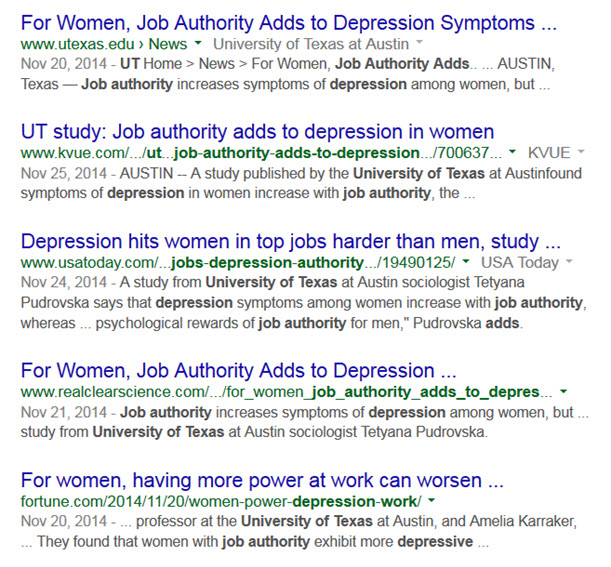I was stunned at the implications referenced by this brief post at 3Plus International, which addresses research on career women, depression, and positions of “authority.”
 As reproduced in numerous press outlets, and as captured by a succinct (misleading) headline, we seem to be cautioned that “job authority adds to depression” in women.
As reproduced in numerous press outlets, and as captured by a succinct (misleading) headline, we seem to be cautioned that “job authority adds to depression” in women.
How many ways can I rail against what this statement suggests?
Do note that 3Plus was taking issue with these same remarks. I feel compelled to add my two cents to the dangerous (and faulty) conclusions that might be drawn from statements like the above pertaining to women and depression.
A summary of the study’s findings appear on the University of Texas (Austin) website, “For Women, Job Authority Adds to Depression Symptoms.”
The study’s sample population is described as roughly “1300 white, middle-aged men and 1500 white, middle-aged women who graduated from high schools in Wisconsin.” (Limited) additional details are available from the abstract.
The Fifties: A Strange, Contradictory, Mysterious Decade
As the research focuses on those in their mid-fifties, which is interesting in and of itself, let’s consider the following with regard to stressors at this age and stage:
- The so-called midlife crisis may be in full bloom.
- Gray divorce can be a potent destabilizing factor.
- Say hello to the Sandwich: Women are frequently managing both adolescents and aging elders.
- Changes due to growing older become more evident, when women are fighting varying degrees of invisibility (and related pressures), far less a burden on men.
I purposely do not include menopause in the items above, as even that sort of reference is rife with myth and misconceptions. Instead, I include the powerful societal and familial issues that persist in one’s fifties – in particular among American women.
Apples and Oranges?
Might it make more sense to compare 54-year-old women in supervisory/managerial positions to 54-year-old women in general?
Shall we adjust for financial status (that includes debt), for the presence or absence of children in the household, for health, for responsibilities for elder care?
Shall we adjust for marital status — and more specifically, some measure of self-reported contentment with that status?
And what about the self-reporting element itself? Aren’t women more likely to be honest about their feelings than men, and wouldn’t this skew results?
While we’re at it, is there a reason we aren’t comparing the managerial achievements of 40-year-olds?
When reading the article at the University of Texas website, I find this to be both sad and true:
Years of social science research suggest that women in authority positions deal with interpersonal tension, negative social interactions, negative stereotypes, prejudice, social isolation, as well as resistance from subordinates, colleagues and superiors… Women in authority positions are viewed as lacking the assertiveness and confidence of strong leaders. But when these women display such characteristics, they are judged negatively for being unfeminine. This contributes to chronic stress… men in authority positions generally deal with fewer stressors because they do not have to overcome the resistance and negative stereotypes that women often face.
How many of us would agree? Isn’t this the crux of the matter? Isn’t this where our focus should be?
Even so, won’t this vary by industry, not to mention by individual and her circumstances?
Let’s Put “Depression Symptoms” Into Real World Context
It seems to me that the implications of the research as suggested by the article’s title, and subsequently splashed about the web, are as follows: Women shouldn’t be in positions of authority as that leads to depression, or, women in supervisory / managerial roles may be compromising their “mental health.” (Come on. Seriously?)
There is no causality in the study’s findings from what I can tell, though I cannot access the details of the study. (Only the abstract is available.)
Finally, let’s look at how prejudice is perpetuated by the mere fact of a suggestive headline that is spread across the Internet. It’s all very Telephone Tag. Won’t we skim one piece and glance at another, absorbing the headline and going no further? Isn’t the replication of the title damaging, as if solidified by Google optimization as “fact?”
Telephone Tag… Bad News
One derivative article included this:
… it seems that all women in the workplace show more signs of depression than men.
Wouldn’t that be the result of lower earnings, greater work-family burdens in domestic / parenting life, and less mobility professionally speaking? Wouldn’t that be due to the fact that women in general – in or out of the workplace – are more likely to mention signs of depression?
As for the use of the word “show” in this scenario, who is observing / categorizing the display of those signs of depression? Research indicates that family members more frequently attribute “signs” of depression to women than they do the same signs to men.*
We could examine typical depression symptoms including fatigue, sleep problems, pain, loss of appetite, mood changes. Doesn’t an overworked mother under stress demonstrate all of the above — regardless of the authority she holds at work?
What about that self-reporting bias once again, not to mention the fact that it is more socially acceptable for women to mention depression symptoms than men?*
Societal Factors, Cultural and Social Forces
This USA Today report seems more balanced, explicitly placing the following in the second paragraph:
“Our study certainly emphasizes broader societal factors and cultural and social forces, including tenacious unfavorable stereotypes, that make leadership excessively stressful for women compared to men,” said co-author and sociologist Tetyana Pudrovska.
Yet one more derivative article states: “Job authority increases symptoms of depression among women” as its opener. I repeat: Where is the causality in the originating article?
Still, not called out in the versions I read is the Rx to remedy issues of fundamental bias, and I quote from sociologist Tetyana Pudrovska’s initial University of Texas brief:
… the findings indicate “we need to address gender discrimination, hostility and prejudice against women leaders to reduce the psychological costs and increase the psychological rewards of higher-status jobs for women.”
I would add that in a nation with virtually no social safety net, and the burdens of childcare and elder care largely falling to women, infrastructure issues cannot be ignored in any discussion of women in the workforce.
Furthermore, in the proliferation of these damning headlines, the agenda seems clear: to steer more women away from career paths that lead to greater authority, when in fact the research conclusion is prescriptive: to address the underlying obstacles that persist for working women.
Shall we focus there as well as on the many successful women who are showing us how it’s done – obstacles and all?
Note 3/17/15: I couldn’t agree more with the author at 3Plus International who advises us on this topic: “Don’t believe everything you read!”
*There is a great deal of literature on both the gender gap and gender bias in observing and reporting depression symptoms in women. That includes gender bias and the fact that “Beginning in adolescence and continuing throughout the entire life span, women are more likely than men to be diagnosed with depression.” This same source notes that family members are likely to attribute certain symptoms to depression in women whereas they do so less in men. In addition, numerous studies address the fact that women self-report depression symptoms more frequently than men.
You May Also Enjoy

As a divorced mom in my early 50s, I believe we still have quite a ways to go on a cultural level to see improvement in the areas you’ve highlighted.
Personally, I really wish I had raised my 3 kids in a country which invests govt. money and collective appreciation for women by providing paid parental leave, paid sick days and decent paying part time positions as well as respect and competitive wages for care-giving positions.
Until these become part of the U.S. fabric of our daily lives, it’s no wonder so many women struggle with depression and anger and resentment from lack of respect with all the balls we manage to juggle each day.
I was a depression sufferer of over 8 years, since I lost a loved one. I experienced different symptoms all this time like feelings of helplessness and hopelessness, a bleak outlook—nothing will ever get better and there’s nothing i can do to improve my situation, loss of interest in daily activities, no interest in former hobbies, social activities, appetite and weight changes, insomnia, anger and irritability. I thought I will never recover from this illness until a friend of mine recommended a program I followed. It took me 2 months to recover from depression and now, after one year I am cured and have a new life, with new perspectives. I know that depression can be a life destroyer. I really recommend for those suffering from this illness to take action and don’t let them be a victim! Life is beautiful and must be lived!
Hi DA – I’m not quite sure why you were stunned by the article. The author very clearly tell us not to believe everything we read and questions the research and headline. It would be helpful if you could be more specific!
Quite so, Dorothy. I do hope I’ve clarified with my note.